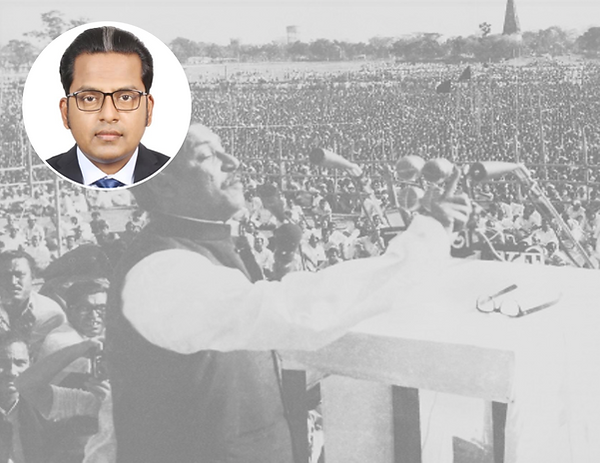Journal of Social and Political
Sciences
ISSN 2615-3718 (Online)
ISSN 2621-5675 (Print)




Published: 04 March 2020
The Speech of Bangabandhu Sheikh Mujibur Rahman on 7th March 1971: A Historical Analysis
Md. Shamsuddoha
Brac University, Bangladesh

Download Full-Text Pdf
10.31014/aior.1991.03.01.161
Pages: 222-234
Keywords: Speech of Bangabandhu, 7th March 1971, Independence, Bangladesh, world heritage, UNESCO
Abstract
The 20th century witnessed a lot of nationalist movements, which gave the birth of many independent states. All these nationalist movements were led by some charismatic leaders who could convince, organize, and motivate people by their character, speech, and wonderful leadership. Bangabandhu Sheikh Mojibur Rahman was one of them. He was such a leader who opened the eyes of the East Pakistani people about their right and led them towards independence. He could ignite the light of the nationalist spirit among the people by his public speaking capacity and heart-rending speech. His historic speech of 7th March 1971 is often considered as one of the most influential speeches over the world. UNESCO recognized the 7th March speech of Bangabandhu Sheikh Mujibur Rahman as part of the world’s documentary heritage in 2017. This study sheds light on the historical importance of that speech. An extensive historical background of this speech will also be demonstrated based on the documents of the liberation war of Bangladesh and other reliable sources. This study shows that the 7th March speech of Bangabandhu paved the way for independent Bangladesh in 1971.
References
- Asadullah, M. N. (2006, July). Educational disparity in East and West Pakistan, 1947-71: Was east Pakistan discriminated against? (J. Humphries, & A. Offer, Eds.) Discussion Papers in Economic and Social History (Paper No-63) , 63, pp. 1-60.
- Bangabandhu Museum.(2019). Retrieved 2019, from https://bangabandhumuseum.org.bd: https://bangabandhumuseum.org.bd/en/page/17/Exhibition-Gallery-2
- Centre for Research and Information. (2018). Retrieved 2019, from YouTube: https://www.youtube.com/watch?v=xkxj9rT5Azk
- Department of Films and Publications- Government of the People’s Republic of Bangladesh. (2017). Retrieved April 28, 2017, from 7th March Foundation: http://www.7thmarch.com/the-speech-text/
- Field, J. F. (2013). We Shall Fight on the Beaches: The Speeches That Inspired History. UK: Michael O'Mara Books Limited.
- Haque, M. (2017). Bangabandhur 7 E Marcher Bahashon: Bachik O Bhashik Boishishtyo (7th March Speech of Bangabandhu : Articulative and Linguistic Features). In A. Wahab (Ed.), Bangabandhur Shaat Marcher Bahshon: Itihash O Tatto (Bangabandhu's Speech of 7th March: History and Theory)(Vol. II, p. 272). Mowla Brothers.
- Hasina, S. (2019). Sheikh Mujib Amar Pita (Sheikh Mujib: My Father). Dhaka: Agamee Prakashani.
- Hasina, S. (2014). The historic speech of 7th March: Some Memories. In A. Wahab (Ed.), Bangabandhur Shaat Marcher Bahshon: Itihash O Tatto (Bangabandhu's Speech of 7th March: History and Theory) (Vol. I, pp. 91-92). Dhaka: Mowla Brothers.
- Husain, S. A. (2019). Youtube. Retrieved 2019, from Views (Youtube Channel): https://www.youtube.com/watch?v=vQFh5G4Rj3w
- Jahan, R. (1973). Pakistan: failure in national integration. London, UK: Oxford University Press.
- Kaler Kantho. (2017, November). Retrieved 2018, from Kaler Kantho: https://www.kalerkantho.com/online/miscellaneous/2017/11/24/569631
- Mahmud, A. (2019). Introduction. In A. Mahmud (Ed.), Bangabandhur Shaat Marcher Bhashon Boishyik Pramanno Oitijhya (The 7th March Speech of Bangabandhu : World's Documentary Heritage (p. 9). Dhaka: National Publications.
- Mujib. (n.d.). Video.
- Noor, S. (2019). The Struggle this Time is the Struggle for Our Independence: A Critical Discourse Analysis of Bangabandhu Sheikh Mujibur Rahman’s Historic 7th March Speech. Advances in Language and Literature Studies , 20 (2), 107-120.
- O’Grady, G. (2017). “I think” in political speech. International Review of Pragmatics , 9, 269–303.
- Rahim, E. (1997). Prelude to war of Liberation. In S. Islam (Ed.), History of Bangladesh: 1704-1971 (Vol. 1, pp. 604-605). Asiatic Society of Bangladesh.
- Rahman, H. H. (Ed.). (2009). The Documents of the Independence War of Bangladesh (Vol. 2). Dhaka: Hakkani Publishers (on behalf of Ministry of Information, Government of People's Republic of Bangladesh).
- Rahman, H. H. (Ed.). (2009). The Documents of the Independence War of Bangladesh (Vol. 1). Dhaka, Bangladesh: Hakkani Publishers (on behalf of Ministry of Information, Government of People's Republic of Bangladesh).
- Rahman, S. M. (2012). Ausamapta Atmajiboni (Unfinished Memoirs). Dhaka: The University Press Limited.
- Schendel, W. V. (2012). A History of Bangladesh. New York: Cambridge University Press.
- Shahnawaz, A. K. (2019). Shat Marcher Bhashon :Bishyo Oitijjhya Dolil (The 7th March Speech: Document of World Heritage). Dhaka: Protik Prokashona Shongstha.
- Shamsuddoha, M. (2017). Influence of Bengali Nationalism and the Emergence of Independent Bangladesh in 1971. i-Proclaim 3rd Annual Research Conference on Business, Humanity and Law (ARCBHL-2017). Kuala Lampur: i-Proclaim, Malaysia.
- Shamsuddoha, M. (2017). Refugees in India during the Liberation War of Bangladesh and Human Rights: A Historical Analysis. 14th International Conference on Social Science and Humanities (ICSSH). Bangkok: PEOPLE: International Journal of Social Sciences .
- Siddique, A. A. (2016). Bangabandhu: The Man Behind the Nation. Retrieved 2019, from http://www.bangabandhu.com.bd/download/the-greatest-speech-of-the-greatest-bangali-by-a-a-m-s-arefin-siddique/: http://www.bangabandhu.com.bd/download/the-greatest-speech-of-the-greatest-bangali-by-a-a-m-s-arefin-siddique/
- UNESCO. (2017). Retrieved 2019, from http://www.unesco.org/new/en/communication-and-information/memory-of-the-world/register/full-list-of-registered-heritage/registered-heritage-page-4/the-historic-7th-march-speech-of-bangabandhu-sheikh-mujibur-rahman/
- University of Central Arkansas.(2019). Retrieved 2019, from https://uca.edu/politicalscience: https://uca.edu/politicalscience/dadm-project/asiapacific-region/pakistanbangladesh-1947-1971/
- Wahab, A. (2014). Bangabandhur 7 Marcher Bhashon : Folklore O Manobotar Joyogaan : (7th March Speech of Bangabandhu : Folklore and Humanity). In A. Wahab (Ed.), Bangabandhur Shaat Marcher Bahshon: Itihash O Tatto (Bangabandhu's Speech of 7th March: History and Theory) (Vol. I, p. 51). Dhaka: Mowla Brothers.
